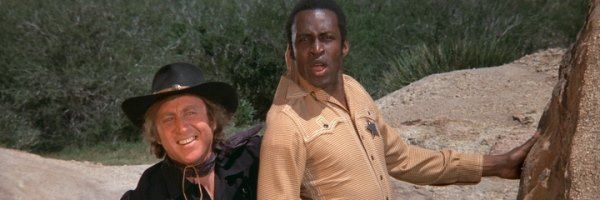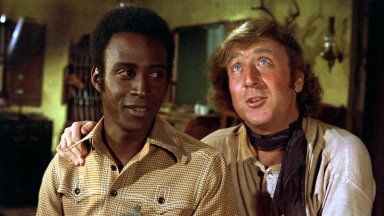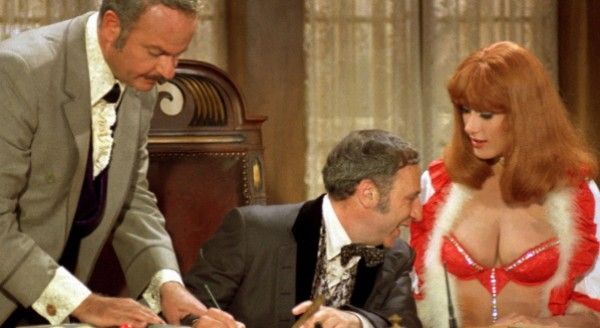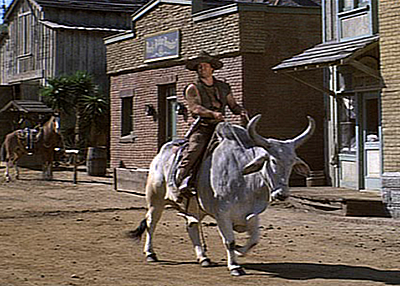Warner Brothers must have both wanted to capitalize and mock the release of Seth MacFarlane’s A Million Ways to Die in the West, as they’ve just created a slightly new special edition of Blazing Saddles for the film’s 40th anniversary. There was no way (and no offense to MacFarlane) that he could match or top Mel Brooks’ film, which is hard to call his masterpiece or even the best film he directed that year. But that’s only because in 1974 both it and Young Frankenstein were released. Which is the better movie boils down to preference. That said, I prefer Saddles. The film stars Cleavon Little, Gene Wilder, Harvey Korman and Madeline Kahn in this Western send up, and my Blazing Saddles Blu-ray review follows after the jump.
Starting with the title song, everything is on point in Blazing Saddles as Brooks treats the film like a feature length Looney Tunes cartoon. The film opens with a bunch of men working on the railroad, and there we’re introduced to two of the villains in Slim Pickens’ Taggart and Burton Gilliam’s Lyle, and then our protagonist Bart (Little) who’s asked to sing an old slave song and so he belts out Cole Porter. Regardless of audience’s awareness of Porter and his connection to New York’s musical scene in the 1920’s and 30’s, it tells the audience that whatever the expectations are for this character, they’re not going to jibe with a stereotype. Bart’s sharp tongue gets him in trouble, and so does his temper when he’s left for dead, which sends him to Hedley Lamarr (Korman, and again, it’s funny that he’s constantly correcting people even if you don’t know who Hedy Lamarr is) to be hung.
But in a twist of fate, Lamarr -- who is trying to get all of the residence out of the town of Rock Ridge to own the property the railroad is going through -- decides it’s better to make Bart the Sheriff of Rock Ridge as he thinks that will send the townsfolk running, while it may also make the Governor William J. Lepetomane (Brooks) both happy and famous for his tolerance. The Rock Ridge people, who all have the last name Johnson at first reject Bart’s hiring and plan to kill him, but he thinks his way out of the situation and into his office, where he meets Jim (Wilder) in a holding cell. Jim is on Bart’s level and Jim reveals he’s The Waco Kid, the fastest hands in the west, though he’s turned himself into a drunk.
When the town doesn’t kill Bart immediately Hedley sends in Mongo (Alex Karras) a gigantic brute who can punch out a horse. And when Bart defeats Mongo, the town grows to at least not totally hate the sheriff. Then Hedley sends Lili Von Shtupp (Kahn) to seduce the sheriff, but his sexual prowess tames her (alas, Brooks cut one of my favorite jokes. In the film she asks “is it true what they say about your people?... It’s true, it’s true.” In the original version his response to that is “Baby, you’re sucking my elbow.”). Running out of options, Hedley amasses the worst of the worst to stampede the town, but Bart’s still got some tricks up his sleeve.
This summary is done mostly without spoiling the jokes, which points out that Saddles actually tells a strong western narrative, and points out why the best parody films work. When these sorts of films just string jokes on to a pre-existing narrative, not only do you know exactly where you are (especially if it’s following something all too familiar), but the only surprise comes in where it veers left or right, often to no greater benefit to the story. Whereas here, the object of satire is the western -- though that’s not exactly true. The real target is bigotry.
The entire film is about how almost everyone underestimates Bart because he is black, and he is able to act as a Bugs Bunny surrogate because they underestimate him. The film then equates racism with idiocy in such a way that maybe even racists can laugh with and enjoy the movie. Perhaps they don’t get the point. Is the film empowering? That’s an unanswerable question as -- to be the bigger better man -- Bart in no way acts like a perceived black person. Is it then arguing for sublimation, or suggesting stereotypes are just that? One wonders how President Barack Obama feels about the film (I figure it’s one of his favorite movies, and he’s mentioned seeing it when he was thirteen). Regardless, the film is unafraid to use the worst language in a way that is pointed and necessary. If Django Unchained has a grandfather, it’s as much this as it is the Italian westerns that helped forge its style.
This is my favorite Mel Brooks film because it does this sort of parody film (which Brooks basically created with Saddles, though it had antecedents in The Paleface films and many of the Frank Tashlin movies) better than anyone, and if Young Frankenstein and Airplane! (both great films, all arguably top ten comedies of all time) are the competition, I give it to Saddles, because it leaves a mark. Though the supplements suggest this is a brave film, is it worth suggesting that this is one of the most important films in American cinema to deal with race relations? Does it deserve to be on a shelf with Do the Right Thing and Killer of Sheep? It’s a different thing, that’s for sure, but it definitely (and in some ways definitively) shows racism in a way that makes all people who hate black people look stupid. When you consider the revolutionary cinema that was going on in the seventies, it’s amazing that Saddles stands out as one of the few to address race relations. Perhaps Brooks, like George Romero did with Night of the Living Dead, could get away with it in genre. Regardless, it’s one of the all time great comedies.
Warner Brothers presents the film on Blu-ray in a deluxe packaging. There’s also new supplements on the disc, so the transfer is the same as previous Blu-rays, but it comes with better encoding. The set comes in a bigger Blu-ray box that comes with ten collectable art cards. The film is presented widescreen (2.35:1) and in DTS-HD 5.1 Master Audio. The commentary with Mel Brooks runs about 53 minutes, where Mel Brooks talks about how the film came to be and what he likes about the film, and just seems to have been interviewed about the making of the film. It’s a good talk, and fairly insightful. Having heard Brooks do a commentary where he’s watching the movie, this is probably the best commentary possible. It’s followed by “Behind the Scenes: Blaze of Glory: Mel Brooks’ Wild, Wild West” (30 min.) which is a brand new interview with Brooks about the movie.
This is followed with the older supplements: “Behind the Scenes: Back in the Saddle” (28 min.) features Brooks, co-writer Andrew Bergman, stars Gene Wilder, Harvey Korman, Burton Gilliam and producer Michael Hertzberg, and was done in 2001 for the film’s DVD release. It’s followed by the TV pilot for Black Bart (24 min.), the TV version of the movie that starred Louis Gossett Jr. and Gerrit Graham. It’s pretty bad. Seven deleted scenes (10 min.) are included, many of which were used for the television cut of the film (the first scene eliminates the farts from the farting scene), while the theatrical trailer rounds out the set.




